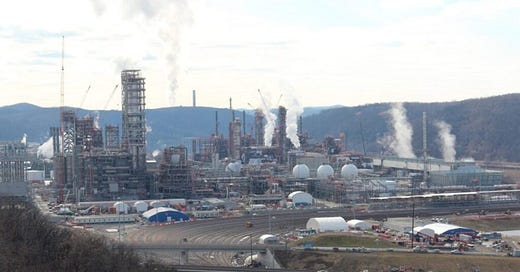Must-read recap: The New Lede's top stories
Shell hit with $10 mln penalty over air pollution; green light for class-action suit to proceed against Bayer AG; a tale of politics, power, and contaminated water in Iowa.
Shell hit with $10 mln penalty over air pollution
Pennsylvania state regulators have ordered a Shell subsidiary to pay nearly $10 million to resolve multiple air permit violations committed by the company’s new petrochemical facility located about 30 miles northwest of Pittsburgh.
The move comes amidst mounting frustration and outrage from area residents and environmental organizations over the plant’s release of hazardous chemicals and foul odors and disruptive flaring – a process designed to burn up invisible harmful hydrocarbons produced through plant operations – in recent months.
Shell’s 386-acre facility, located on the banks of the Ohio River in Beaver County, Pennsylvania near the town of Monaca, is the largest plastics production plant in the Northeast and Shell’s largest petrochemical facility outside of the Gulf Coast. The plant uses a process called “cracking” to convert the natural gas liquid ethane into the petrochemical ethylene, a building block for fossil fuel-derived plastic production.
Since Shell announced the startup of operations in November, the $6 billion plastics production facility has racked up 11 notices of violation – all pertaining to air quality – from the Pennsylvania Department of Environmental Protection (DEP), including four last week alone.
On Wednesday the state announced a consent order and agreement with Shell Chemicals Appalachia, the subsidiary operating the plant. Under the arrangement, the company has formally acknowledged its violations of the state’s Air Pollution Control Act and agreed to pay $4.9 million as a civil penalty plus another $5 million for projects to “benefit community environment and health.” Shell also agreed to make equipment repairs and take “all reasonable and feasible measures” to mitigate excess emissions, along with paying monthly civil penalties for future exceedance of emissions limits for the rest of 2023.
State officials invoked Pennsylvania’s constitutional right to clean air and water in their announcement of the agreement, which they characterized as an action that holds Shell accountable.
“My Administration will continue to work with Shell to ensure they live up to this agreement, and we will be prepared to hold them accountable for any future violations,” Pennsylvania Gov. Josh Shapiro said in a statement. (Read the rest of the story.)
Bayer investors granted class-action status in lawsuit over Monsanto deal
A federal judge has given the green light for a class-action lawsuit to proceed against Bayer AG brought by investors unhappy with the company’s $63 billion purchase of Monsanto Co. in 2018.
The suit, brought by three pension funds, alleges that Bayer AG misled investors over the risks of the acquisition and failed to properly perform due diligence before buying Monsanto, which at that time was the world’s largest seed company and the maker of the popular, but controversial, Roundup weedkiller.
Just weeks after closing the deal, Bayer shares plunged when Monsanto lost a bellwether trial brought by a California groundskeeper who alleged he developed non-Hodgkin lymphoma due to his exposure to Monsanto’s weed killer. The loss triggered a flood of additional litigation and ultimately led Bayer to agree in 2020 to pay roughly $11 billion to try to settle similar claims brought by more than 100,000 plaintiffs.
Bayer’s purchase of Monsanto was dubbed one of the “worst corporate deals” in recent history by the Wall Street Journal.
“These declines in the value of Bayer … caused Lead Plaintiffs and other Class members to suffer significant loss and damages,” wrote the plaintiffs’ law firm, Cohen Milstein, in a statement.
The lead plaintiffs in the action are the Sheet Metal Workers’ National Pension Fund and the International Brotherhood of Teamsters Local No. 710 Pension Fund, along with an additional plaintiff — the International Union of Operating Engineers Pension Fund of Eastern Pennsylvania and Delaware.
Multiple scientific studies have linked Roundup, made with the active ingredient glyphosate, to non-Hodgkin lymphoma (NHL), and in 2015 the World Health Organization’s International Agency for Research on Cancer classified glyphosate as a probable human carcinogen. (Read the rest of the story.)
In Iowa, a tale of politics, power, and contaminated water
OWA CITY, IOWA – Here in the heart of US farm country, the wretched quality of Iowa waterways is a well-known lament. Farm fields laden with synthetic fertilizers and manure produce bounties of over 2 billion bushels of corn each year, but those same fields also produce a torrent of run-off that contaminates virtually every mile of the state’s streams and rivers and every acre of lakes and ponds.
For Iowa’s farm sector and its powerful political allies, the dire public and environmental consequences are perhaps unfortunate, but acceptable, outcomes of modern, large-scale agriculture – and, importantly, a topic best kept out of the spotlight.
Advocates for solutions to farm-related water contamination recently found out just how difficult it can be to try to shine a light on the problems. Over the last few months, a campaign of political bullying, academic intimidation, and information repression has roiled the state, offering a rare and vivid illustration of the power the agricultural industry can wield to silence challengers and to evade responsibility for its mammoth waste stream.
“It’s not working for Iowans,” said David Cwiertney, director of the Center for Health Effects of Environmental Contamination at the University of Iowa and professor of civil and environmental engineering.
“We’re not changing behavior in agriculture,” he said. “We don’t spend enough time thinking about the damage we’re causing to people here in Iowa, to water quality impacts.”
The Iowa saga began in March when two senior Republican state lawmakers decided a state water quality researcher, who was tracking and mapping water quality problems and writing a blog about agriculture’s culpability, was getting a little too much attention.
Sen. Dan Zumbach, the chair of the Senate Agriculture Committee, and Sen. Tom Shipley, chair of the Senate Ethics Committee, reportedly told a lobbyist for the University of Iowa that they wanted to silence the researcher’s widely read, university-sponsored blog because of its aggressive reporting on farm-related water contamination. [cg1] The author of the blog was Chris Jones, a 62-year-old chemist and research engineer at the University of Iowa Institute of Hydraulic Research (IIHR). (Read the rest of the story.)





